The Role of Placebo Effect in UK Healthcare: A Dissertation
VerifiedAdded on 2021/04/19
|67
|18424
|69
Thesis and Dissertation
AI Summary
This dissertation investigates the placebo effect within the UK healthcare system, examining its meaning, influencing factors, and challenges. The research explores the concept of placebo treatments, their impact on patient outcomes, and the psychological and physiological mechanisms involved. The study delves into factors affecting the placebo effect, such as the patient-doctor relationship, treatment heterogeneity, and patient beliefs. The research methodology includes a literature review, data analysis, and findings that address the research questions. The dissertation aims to provide recommendations for improving the placebo effect, offering strategies for healthcare organizations to enhance patient care. The findings highlight the significance of understanding the placebo effect for effective patient treatment and clinical study management, emphasizing the importance of patient perception and the need for standardized treatment approaches within the UK healthcare context. The conclusion summarizes the research findings and offers practical recommendations for future research and healthcare practices.
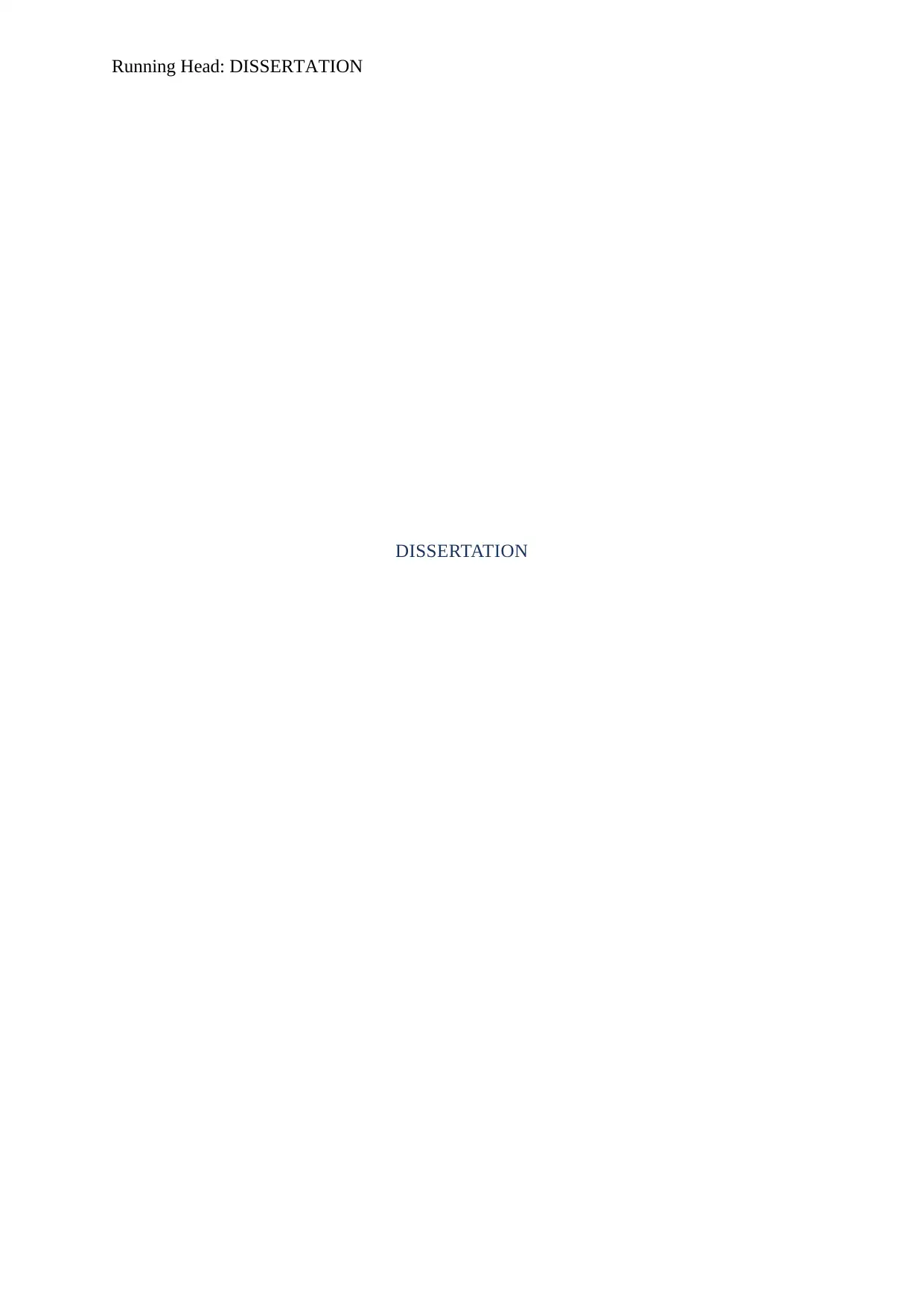
Running Head: DISSERTATION
DISSERTATION
DISSERTATION
Paraphrase This Document
Need a fresh take? Get an instant paraphrase of this document with our AI Paraphraser
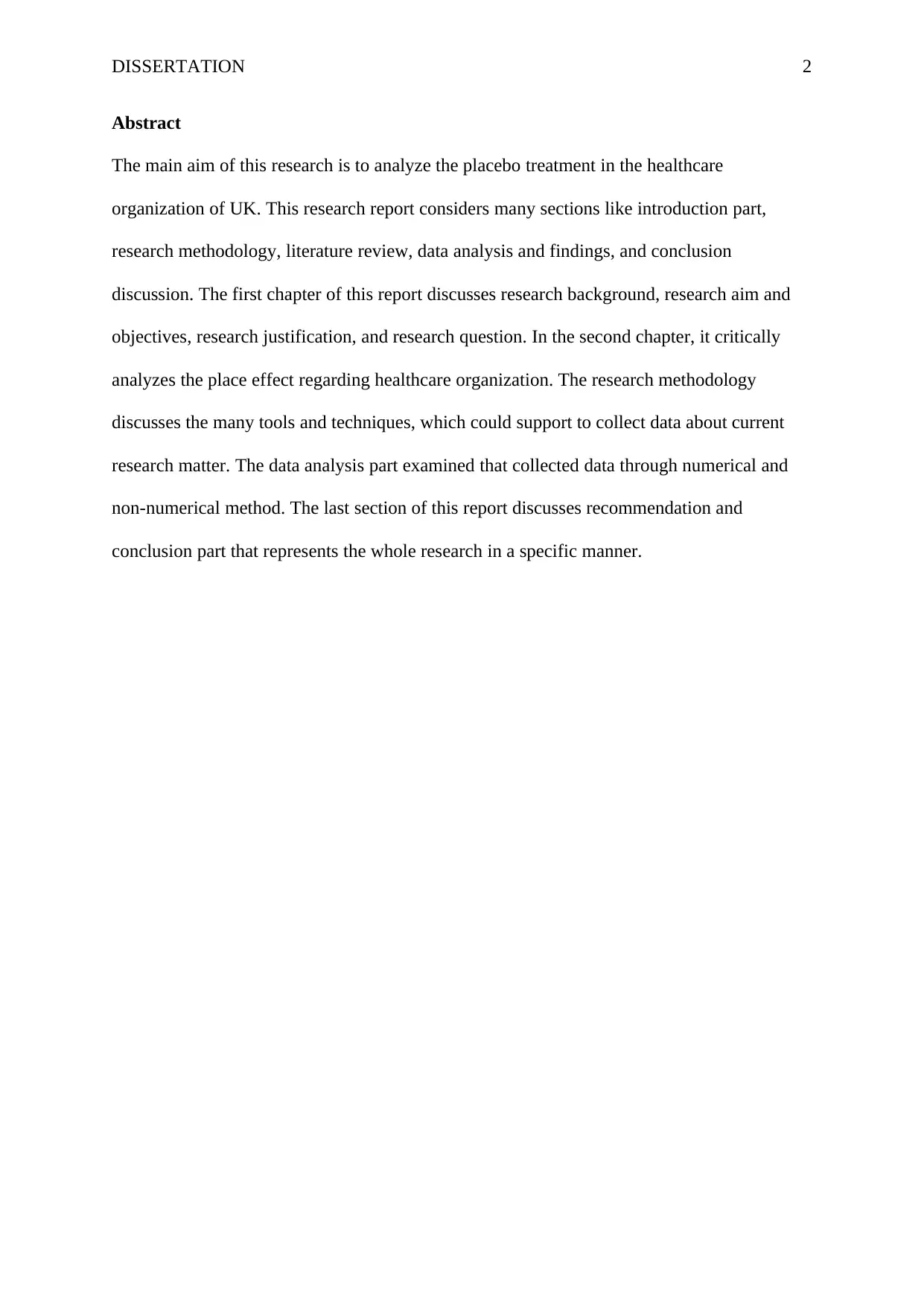
DISSERTATION 2
Abstract
The main aim of this research is to analyze the placebo treatment in the healthcare
organization of UK. This research report considers many sections like introduction part,
research methodology, literature review, data analysis and findings, and conclusion
discussion. The first chapter of this report discusses research background, research aim and
objectives, research justification, and research question. In the second chapter, it critically
analyzes the place effect regarding healthcare organization. The research methodology
discusses the many tools and techniques, which could support to collect data about current
research matter. The data analysis part examined that collected data through numerical and
non-numerical method. The last section of this report discusses recommendation and
conclusion part that represents the whole research in a specific manner.
Abstract
The main aim of this research is to analyze the placebo treatment in the healthcare
organization of UK. This research report considers many sections like introduction part,
research methodology, literature review, data analysis and findings, and conclusion
discussion. The first chapter of this report discusses research background, research aim and
objectives, research justification, and research question. In the second chapter, it critically
analyzes the place effect regarding healthcare organization. The research methodology
discusses the many tools and techniques, which could support to collect data about current
research matter. The data analysis part examined that collected data through numerical and
non-numerical method. The last section of this report discusses recommendation and
conclusion part that represents the whole research in a specific manner.
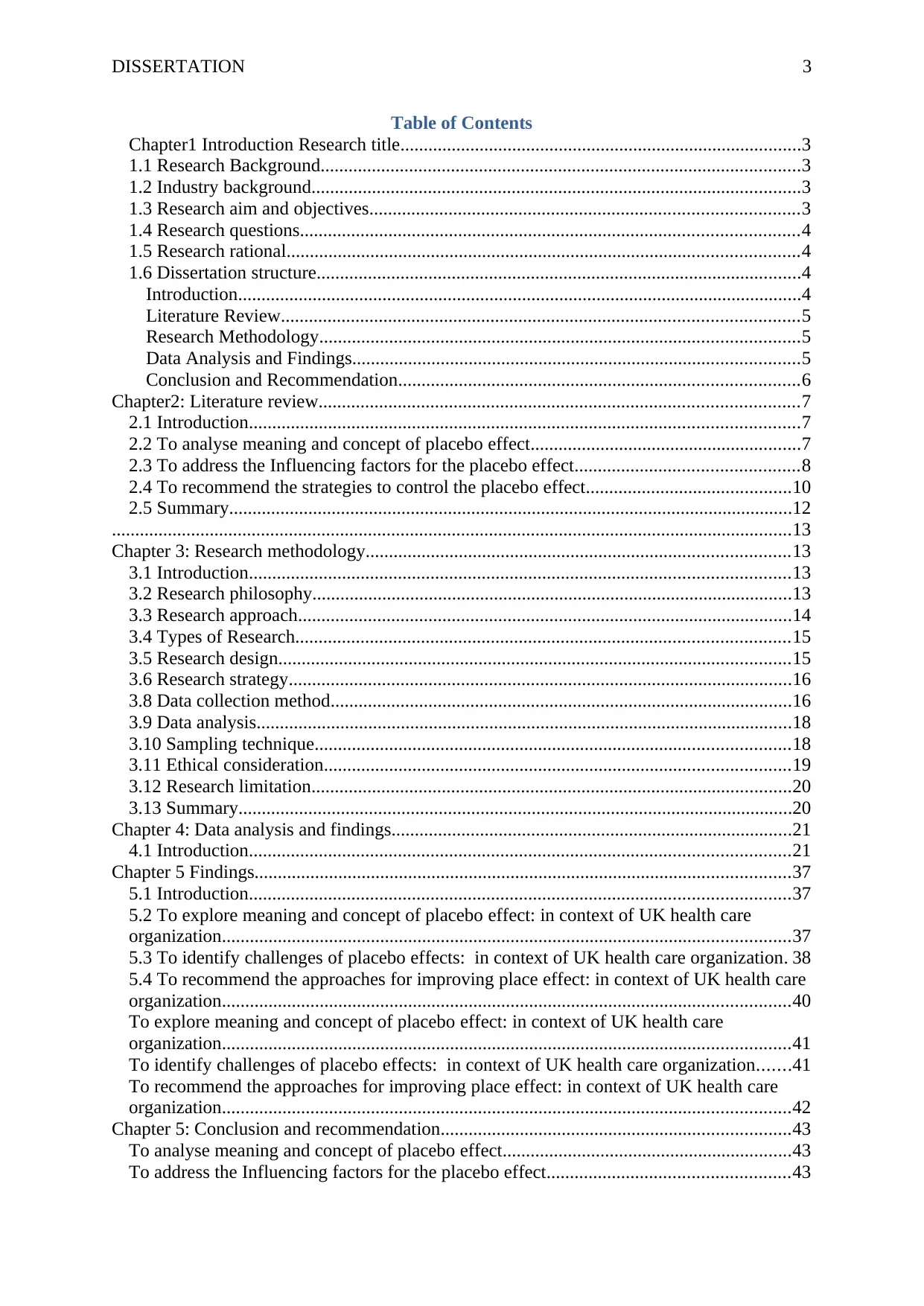
DISSERTATION 3
Table of Contents
Chapter1 Introduction Research title......................................................................................3
1.1 Research Background.......................................................................................................3
1.2 Industry background.........................................................................................................3
1.3 Research aim and objectives............................................................................................3
1.4 Research questions...........................................................................................................4
1.5 Research rational..............................................................................................................4
1.6 Dissertation structure........................................................................................................4
Introduction.........................................................................................................................4
Literature Review...............................................................................................................5
Research Methodology.......................................................................................................5
Data Analysis and Findings................................................................................................5
Conclusion and Recommendation......................................................................................6
Chapter2: Literature review.......................................................................................................7
2.1 Introduction......................................................................................................................7
2.2 To analyse meaning and concept of placebo effect..........................................................7
2.3 To address the Influencing factors for the placebo effect................................................8
2.4 To recommend the strategies to control the placebo effect............................................10
2.5 Summary.........................................................................................................................12
..................................................................................................................................................13
Chapter 3: Research methodology...........................................................................................13
3.1 Introduction....................................................................................................................13
3.2 Research philosophy.......................................................................................................13
3.3 Research approach..........................................................................................................14
3.4 Types of Research..........................................................................................................15
3.5 Research design..............................................................................................................15
3.6 Research strategy............................................................................................................16
3.8 Data collection method...................................................................................................16
3.9 Data analysis...................................................................................................................18
3.10 Sampling technique......................................................................................................18
3.11 Ethical consideration....................................................................................................19
3.12 Research limitation.......................................................................................................20
3.13 Summary.......................................................................................................................20
Chapter 4: Data analysis and findings......................................................................................21
4.1 Introduction....................................................................................................................21
Chapter 5 Findings...................................................................................................................37
5.1 Introduction....................................................................................................................37
5.2 To explore meaning and concept of placebo effect: in context of UK health care
organization..........................................................................................................................37
5.3 To identify challenges of placebo effects: in context of UK health care organization. 38
5.4 To recommend the approaches for improving place effect: in context of UK health care
organization..........................................................................................................................40
To explore meaning and concept of placebo effect: in context of UK health care
organization..........................................................................................................................41
To identify challenges of placebo effects: in context of UK health care organization.......41
To recommend the approaches for improving place effect: in context of UK health care
organization..........................................................................................................................42
Chapter 5: Conclusion and recommendation...........................................................................43
To analyse meaning and concept of placebo effect..............................................................43
To address the Influencing factors for the placebo effect....................................................43
Table of Contents
Chapter1 Introduction Research title......................................................................................3
1.1 Research Background.......................................................................................................3
1.2 Industry background.........................................................................................................3
1.3 Research aim and objectives............................................................................................3
1.4 Research questions...........................................................................................................4
1.5 Research rational..............................................................................................................4
1.6 Dissertation structure........................................................................................................4
Introduction.........................................................................................................................4
Literature Review...............................................................................................................5
Research Methodology.......................................................................................................5
Data Analysis and Findings................................................................................................5
Conclusion and Recommendation......................................................................................6
Chapter2: Literature review.......................................................................................................7
2.1 Introduction......................................................................................................................7
2.2 To analyse meaning and concept of placebo effect..........................................................7
2.3 To address the Influencing factors for the placebo effect................................................8
2.4 To recommend the strategies to control the placebo effect............................................10
2.5 Summary.........................................................................................................................12
..................................................................................................................................................13
Chapter 3: Research methodology...........................................................................................13
3.1 Introduction....................................................................................................................13
3.2 Research philosophy.......................................................................................................13
3.3 Research approach..........................................................................................................14
3.4 Types of Research..........................................................................................................15
3.5 Research design..............................................................................................................15
3.6 Research strategy............................................................................................................16
3.8 Data collection method...................................................................................................16
3.9 Data analysis...................................................................................................................18
3.10 Sampling technique......................................................................................................18
3.11 Ethical consideration....................................................................................................19
3.12 Research limitation.......................................................................................................20
3.13 Summary.......................................................................................................................20
Chapter 4: Data analysis and findings......................................................................................21
4.1 Introduction....................................................................................................................21
Chapter 5 Findings...................................................................................................................37
5.1 Introduction....................................................................................................................37
5.2 To explore meaning and concept of placebo effect: in context of UK health care
organization..........................................................................................................................37
5.3 To identify challenges of placebo effects: in context of UK health care organization. 38
5.4 To recommend the approaches for improving place effect: in context of UK health care
organization..........................................................................................................................40
To explore meaning and concept of placebo effect: in context of UK health care
organization..........................................................................................................................41
To identify challenges of placebo effects: in context of UK health care organization.......41
To recommend the approaches for improving place effect: in context of UK health care
organization..........................................................................................................................42
Chapter 5: Conclusion and recommendation...........................................................................43
To analyse meaning and concept of placebo effect..............................................................43
To address the Influencing factors for the placebo effect....................................................43
⊘ This is a preview!⊘
Do you want full access?
Subscribe today to unlock all pages.

Trusted by 1+ million students worldwide
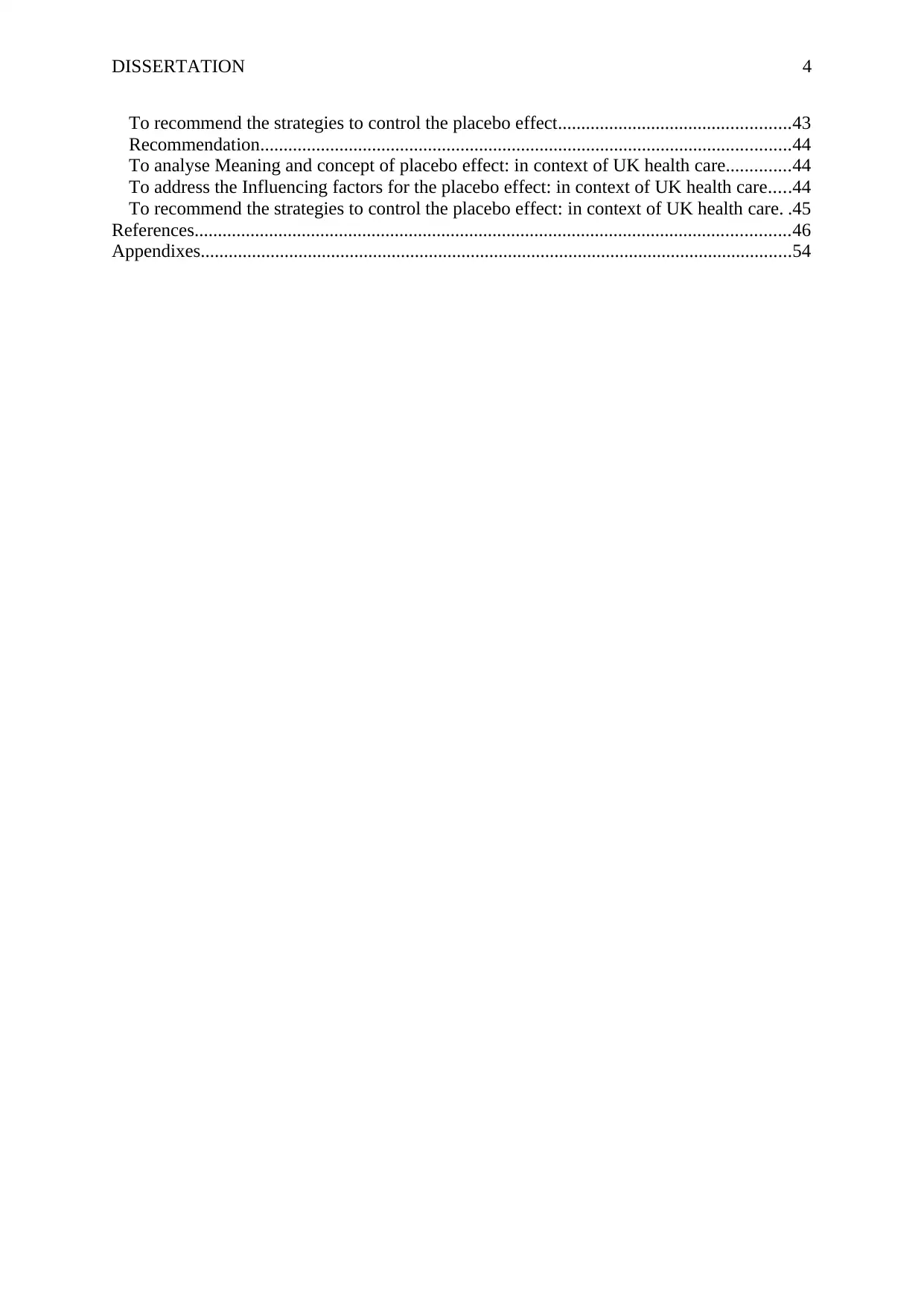
DISSERTATION 4
To recommend the strategies to control the placebo effect..................................................43
Recommendation..................................................................................................................44
To analyse Meaning and concept of placebo effect: in context of UK health care..............44
To address the Influencing factors for the placebo effect: in context of UK health care.....44
To recommend the strategies to control the placebo effect: in context of UK health care. .45
References................................................................................................................................46
Appendixes...............................................................................................................................54
To recommend the strategies to control the placebo effect..................................................43
Recommendation..................................................................................................................44
To analyse Meaning and concept of placebo effect: in context of UK health care..............44
To address the Influencing factors for the placebo effect: in context of UK health care.....44
To recommend the strategies to control the placebo effect: in context of UK health care. .45
References................................................................................................................................46
Appendixes...............................................................................................................................54
Paraphrase This Document
Need a fresh take? Get an instant paraphrase of this document with our AI Paraphraser
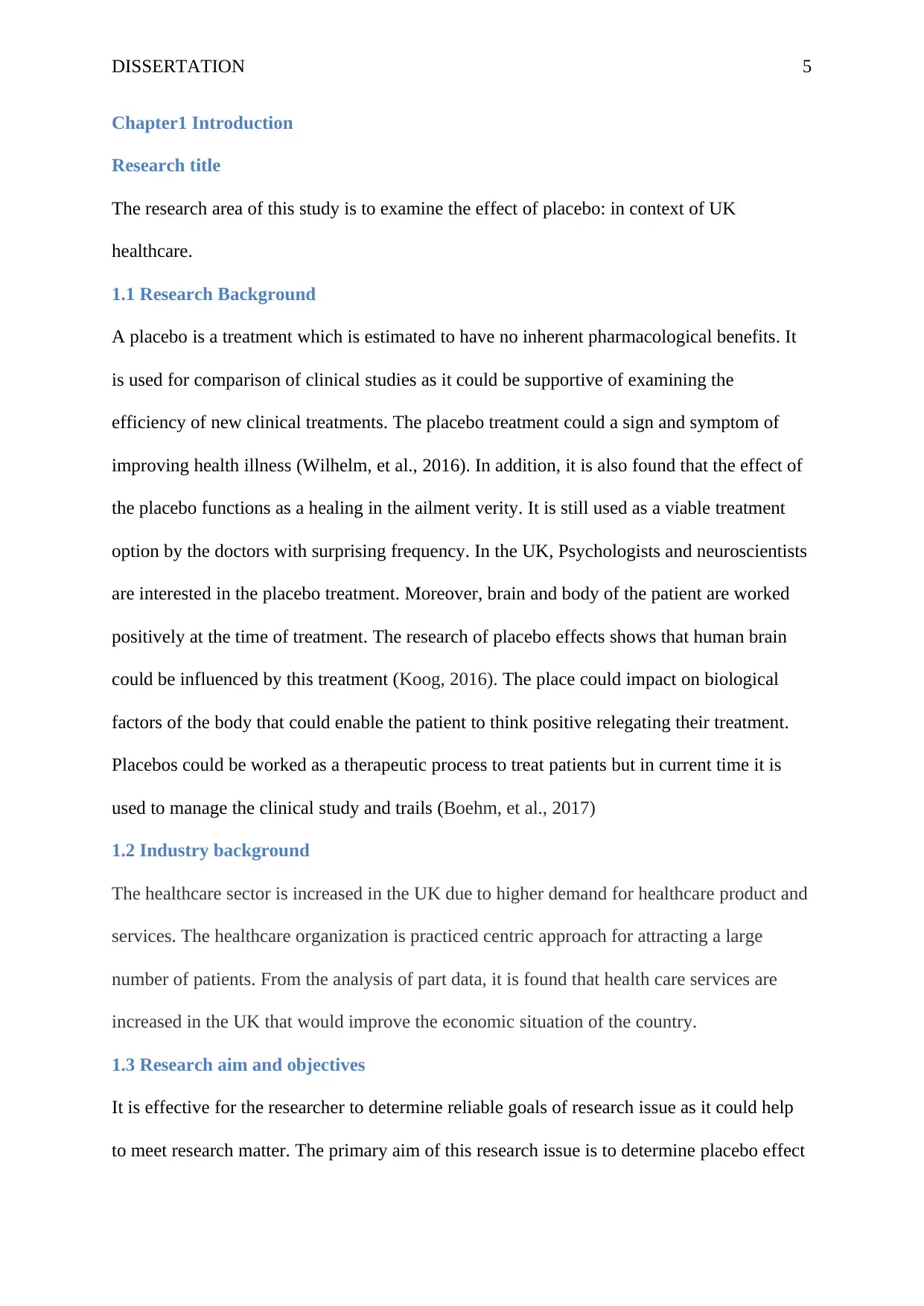
DISSERTATION 5
Chapter1 Introduction
Research title
The research area of this study is to examine the effect of placebo: in context of UK
healthcare.
1.1 Research Background
A placebo is a treatment which is estimated to have no inherent pharmacological benefits. It
is used for comparison of clinical studies as it could be supportive of examining the
efficiency of new clinical treatments. The placebo treatment could a sign and symptom of
improving health illness (Wilhelm, et al., 2016). In addition, it is also found that the effect of
the placebo functions as a healing in the ailment verity. It is still used as a viable treatment
option by the doctors with surprising frequency. In the UK, Psychologists and neuroscientists
are interested in the placebo treatment. Moreover, brain and body of the patient are worked
positively at the time of treatment. The research of placebo effects shows that human brain
could be influenced by this treatment (Koog, 2016). The place could impact on biological
factors of the body that could enable the patient to think positive relegating their treatment.
Placebos could be worked as a therapeutic process to treat patients but in current time it is
used to manage the clinical study and trails (Boehm, et al., 2017)
1.2 Industry background
The healthcare sector is increased in the UK due to higher demand for healthcare product and
services. The healthcare organization is practiced centric approach for attracting a large
number of patients. From the analysis of part data, it is found that health care services are
increased in the UK that would improve the economic situation of the country.
1.3 Research aim and objectives
It is effective for the researcher to determine reliable goals of research issue as it could help
to meet research matter. The primary aim of this research issue is to determine placebo effect
Chapter1 Introduction
Research title
The research area of this study is to examine the effect of placebo: in context of UK
healthcare.
1.1 Research Background
A placebo is a treatment which is estimated to have no inherent pharmacological benefits. It
is used for comparison of clinical studies as it could be supportive of examining the
efficiency of new clinical treatments. The placebo treatment could a sign and symptom of
improving health illness (Wilhelm, et al., 2016). In addition, it is also found that the effect of
the placebo functions as a healing in the ailment verity. It is still used as a viable treatment
option by the doctors with surprising frequency. In the UK, Psychologists and neuroscientists
are interested in the placebo treatment. Moreover, brain and body of the patient are worked
positively at the time of treatment. The research of placebo effects shows that human brain
could be influenced by this treatment (Koog, 2016). The place could impact on biological
factors of the body that could enable the patient to think positive relegating their treatment.
Placebos could be worked as a therapeutic process to treat patients but in current time it is
used to manage the clinical study and trails (Boehm, et al., 2017)
1.2 Industry background
The healthcare sector is increased in the UK due to higher demand for healthcare product and
services. The healthcare organization is practiced centric approach for attracting a large
number of patients. From the analysis of part data, it is found that health care services are
increased in the UK that would improve the economic situation of the country.
1.3 Research aim and objectives
It is effective for the researcher to determine reliable goals of research issue as it could help
to meet research matter. The primary aim of this research issue is to determine placebo effect
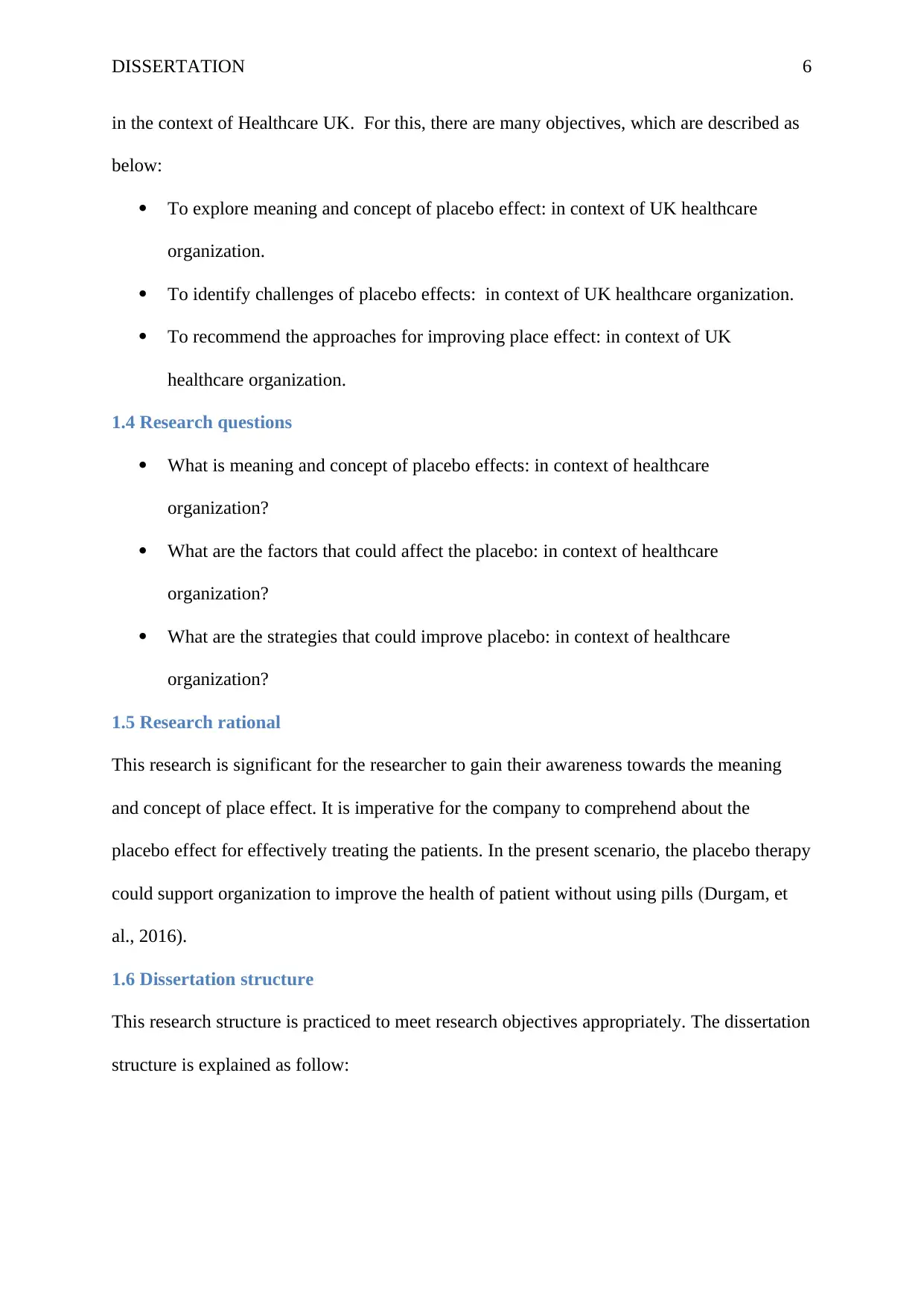
DISSERTATION 6
in the context of Healthcare UK. For this, there are many objectives, which are described as
below:
To explore meaning and concept of placebo effect: in context of UK healthcare
organization.
To identify challenges of placebo effects: in context of UK healthcare organization.
To recommend the approaches for improving place effect: in context of UK
healthcare organization.
1.4 Research questions
What is meaning and concept of placebo effects: in context of healthcare
organization?
What are the factors that could affect the placebo: in context of healthcare
organization?
What are the strategies that could improve placebo: in context of healthcare
organization?
1.5 Research rational
This research is significant for the researcher to gain their awareness towards the meaning
and concept of place effect. It is imperative for the company to comprehend about the
placebo effect for effectively treating the patients. In the present scenario, the placebo therapy
could support organization to improve the health of patient without using pills (Durgam, et
al., 2016).
1.6 Dissertation structure
This research structure is practiced to meet research objectives appropriately. The dissertation
structure is explained as follow:
in the context of Healthcare UK. For this, there are many objectives, which are described as
below:
To explore meaning and concept of placebo effect: in context of UK healthcare
organization.
To identify challenges of placebo effects: in context of UK healthcare organization.
To recommend the approaches for improving place effect: in context of UK
healthcare organization.
1.4 Research questions
What is meaning and concept of placebo effects: in context of healthcare
organization?
What are the factors that could affect the placebo: in context of healthcare
organization?
What are the strategies that could improve placebo: in context of healthcare
organization?
1.5 Research rational
This research is significant for the researcher to gain their awareness towards the meaning
and concept of place effect. It is imperative for the company to comprehend about the
placebo effect for effectively treating the patients. In the present scenario, the placebo therapy
could support organization to improve the health of patient without using pills (Durgam, et
al., 2016).
1.6 Dissertation structure
This research structure is practiced to meet research objectives appropriately. The dissertation
structure is explained as follow:
⊘ This is a preview!⊘
Do you want full access?
Subscribe today to unlock all pages.

Trusted by 1+ million students worldwide
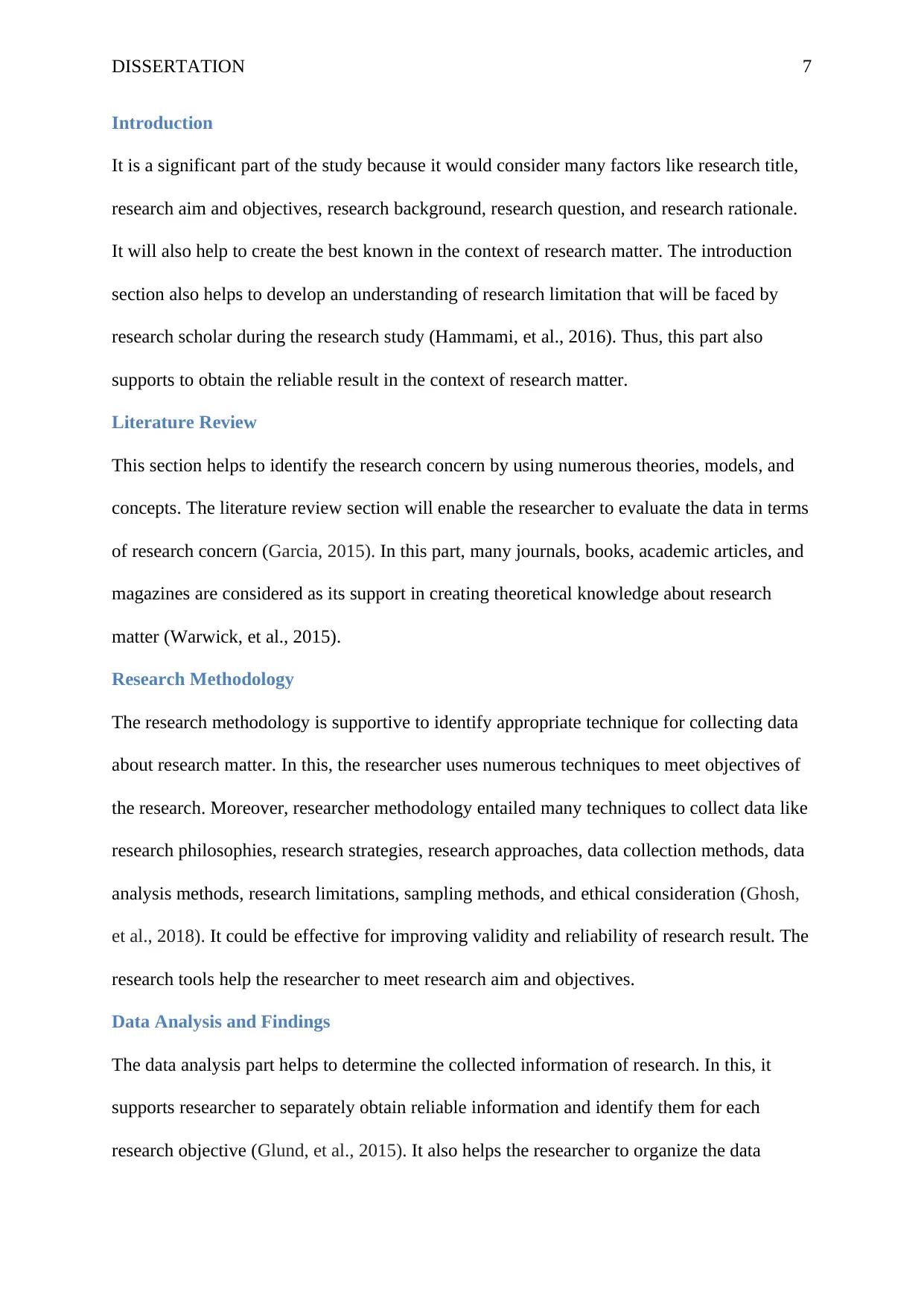
DISSERTATION 7
Introduction
It is a significant part of the study because it would consider many factors like research title,
research aim and objectives, research background, research question, and research rationale.
It will also help to create the best known in the context of research matter. The introduction
section also helps to develop an understanding of research limitation that will be faced by
research scholar during the research study (Hammami, et al., 2016). Thus, this part also
supports to obtain the reliable result in the context of research matter.
Literature Review
This section helps to identify the research concern by using numerous theories, models, and
concepts. The literature review section will enable the researcher to evaluate the data in terms
of research concern (Garcia, 2015). In this part, many journals, books, academic articles, and
magazines are considered as its support in creating theoretical knowledge about research
matter (Warwick, et al., 2015).
Research Methodology
The research methodology is supportive to identify appropriate technique for collecting data
about research matter. In this, the researcher uses numerous techniques to meet objectives of
the research. Moreover, researcher methodology entailed many techniques to collect data like
research philosophies, research strategies, research approaches, data collection methods, data
analysis methods, research limitations, sampling methods, and ethical consideration (Ghosh,
et al., 2018). It could be effective for improving validity and reliability of research result. The
research tools help the researcher to meet research aim and objectives.
Data Analysis and Findings
The data analysis part helps to determine the collected information of research. In this, it
supports researcher to separately obtain reliable information and identify them for each
research objective (Glund, et al., 2015). It also helps the researcher to organize the data
Introduction
It is a significant part of the study because it would consider many factors like research title,
research aim and objectives, research background, research question, and research rationale.
It will also help to create the best known in the context of research matter. The introduction
section also helps to develop an understanding of research limitation that will be faced by
research scholar during the research study (Hammami, et al., 2016). Thus, this part also
supports to obtain the reliable result in the context of research matter.
Literature Review
This section helps to identify the research concern by using numerous theories, models, and
concepts. The literature review section will enable the researcher to evaluate the data in terms
of research concern (Garcia, 2015). In this part, many journals, books, academic articles, and
magazines are considered as its support in creating theoretical knowledge about research
matter (Warwick, et al., 2015).
Research Methodology
The research methodology is supportive to identify appropriate technique for collecting data
about research matter. In this, the researcher uses numerous techniques to meet objectives of
the research. Moreover, researcher methodology entailed many techniques to collect data like
research philosophies, research strategies, research approaches, data collection methods, data
analysis methods, research limitations, sampling methods, and ethical consideration (Ghosh,
et al., 2018). It could be effective for improving validity and reliability of research result. The
research tools help the researcher to meet research aim and objectives.
Data Analysis and Findings
The data analysis part helps to determine the collected information of research. In this, it
supports researcher to separately obtain reliable information and identify them for each
research objective (Glund, et al., 2015). It also helps the researcher to organize the data
Paraphrase This Document
Need a fresh take? Get an instant paraphrase of this document with our AI Paraphraser
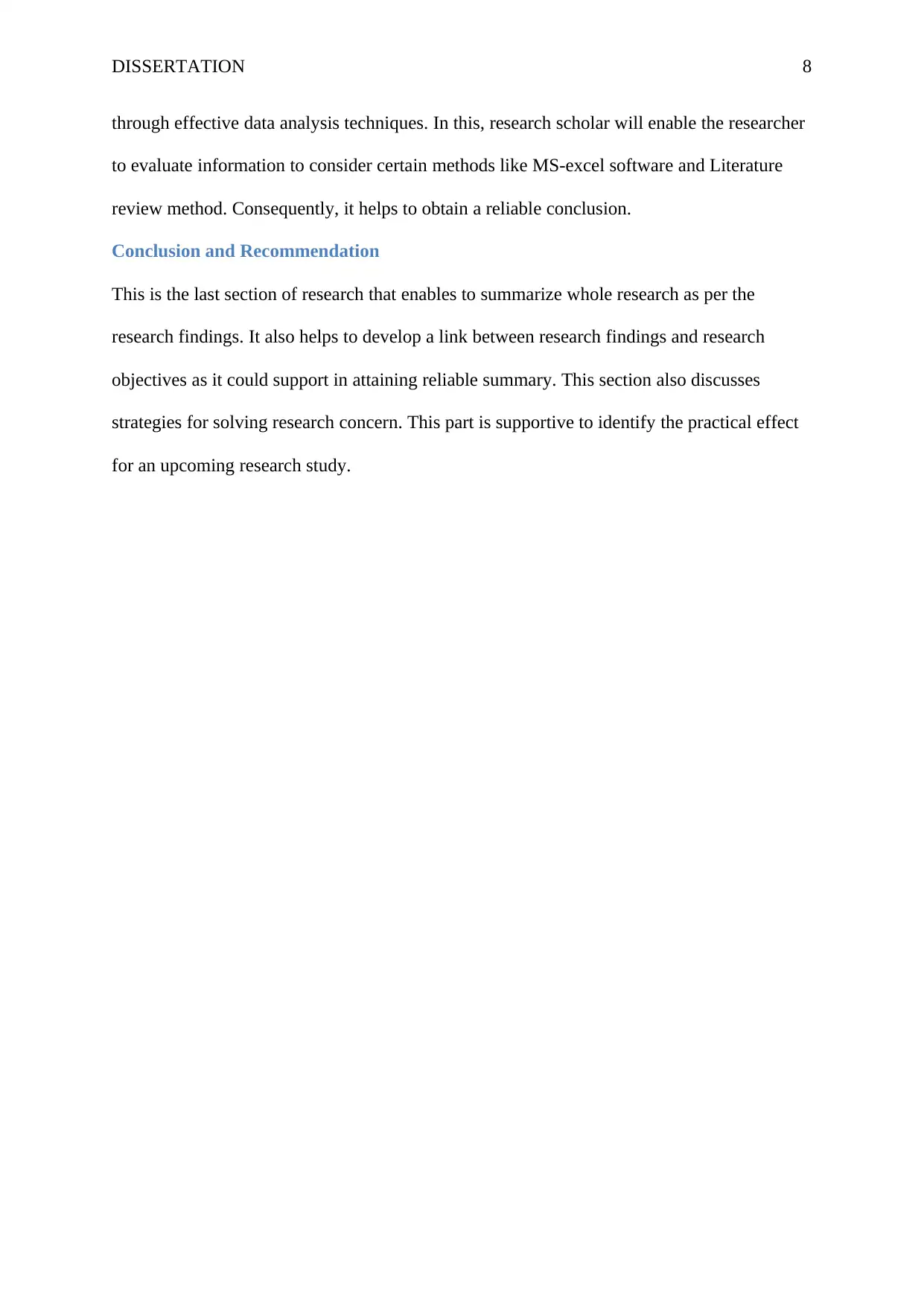
DISSERTATION 8
through effective data analysis techniques. In this, research scholar will enable the researcher
to evaluate information to consider certain methods like MS-excel software and Literature
review method. Consequently, it helps to obtain a reliable conclusion.
Conclusion and Recommendation
This is the last section of research that enables to summarize whole research as per the
research findings. It also helps to develop a link between research findings and research
objectives as it could support in attaining reliable summary. This section also discusses
strategies for solving research concern. This part is supportive to identify the practical effect
for an upcoming research study.
through effective data analysis techniques. In this, research scholar will enable the researcher
to evaluate information to consider certain methods like MS-excel software and Literature
review method. Consequently, it helps to obtain a reliable conclusion.
Conclusion and Recommendation
This is the last section of research that enables to summarize whole research as per the
research findings. It also helps to develop a link between research findings and research
objectives as it could support in attaining reliable summary. This section also discusses
strategies for solving research concern. This part is supportive to identify the practical effect
for an upcoming research study.
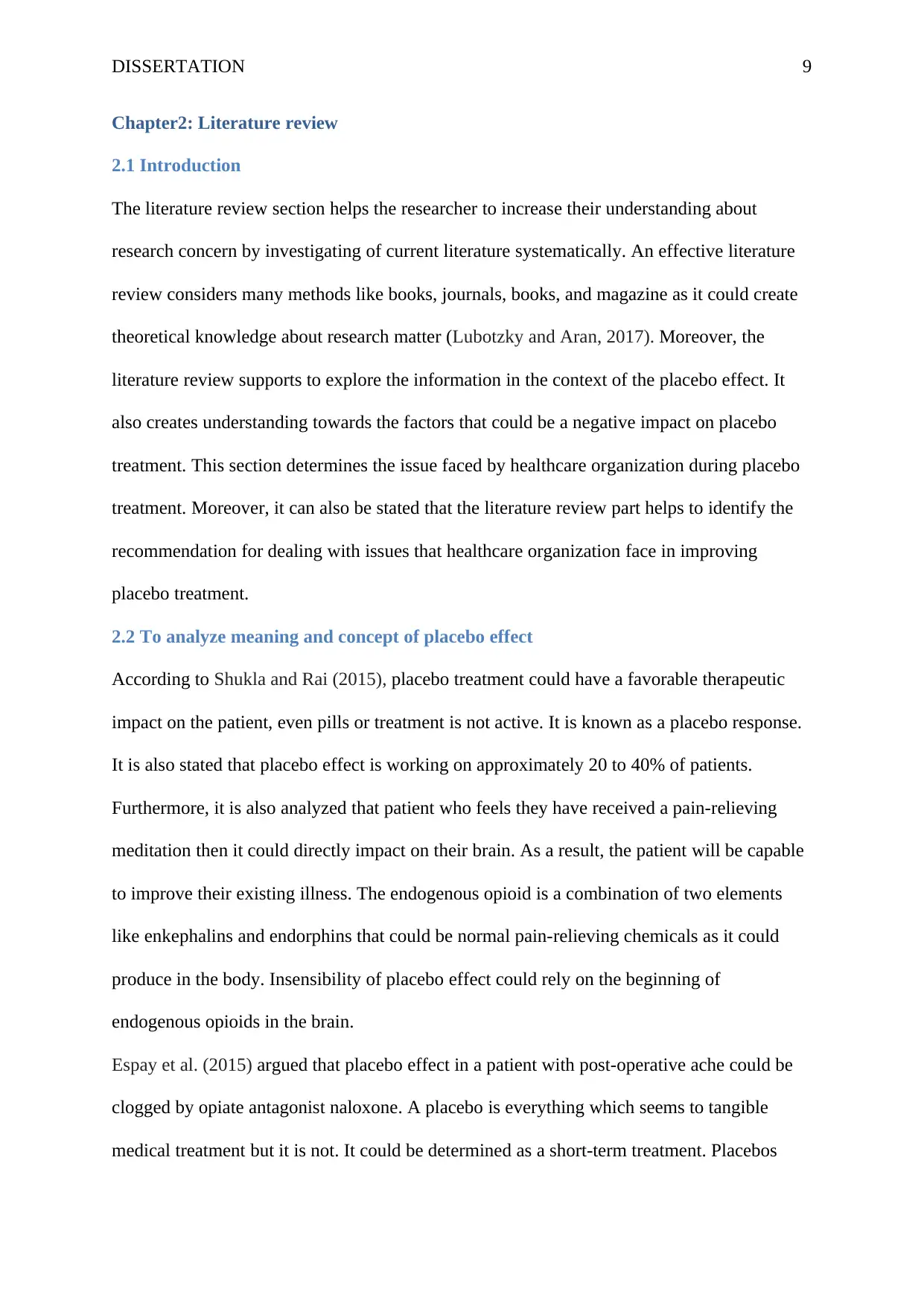
DISSERTATION 9
Chapter2: Literature review
2.1 Introduction
The literature review section helps the researcher to increase their understanding about
research concern by investigating of current literature systematically. An effective literature
review considers many methods like books, journals, books, and magazine as it could create
theoretical knowledge about research matter (Lubotzky and Aran, 2017). Moreover, the
literature review supports to explore the information in the context of the placebo effect. It
also creates understanding towards the factors that could be a negative impact on placebo
treatment. This section determines the issue faced by healthcare organization during placebo
treatment. Moreover, it can also be stated that the literature review part helps to identify the
recommendation for dealing with issues that healthcare organization face in improving
placebo treatment.
2.2 To analyze meaning and concept of placebo effect
According to Shukla and Rai (2015), placebo treatment could have a favorable therapeutic
impact on the patient, even pills or treatment is not active. It is known as a placebo response.
It is also stated that placebo effect is working on approximately 20 to 40% of patients.
Furthermore, it is also analyzed that patient who feels they have received a pain-relieving
meditation then it could directly impact on their brain. As a result, the patient will be capable
to improve their existing illness. The endogenous opioid is a combination of two elements
like enkephalins and endorphins that could be normal pain-relieving chemicals as it could
produce in the body. Insensibility of placebo effect could rely on the beginning of
endogenous opioids in the brain.
Espay et al. (2015) argued that placebo effect in a patient with post-operative ache could be
clogged by opiate antagonist naloxone. A placebo is everything which seems to tangible
medical treatment but it is not. It could be determined as a short-term treatment. Placebos
Chapter2: Literature review
2.1 Introduction
The literature review section helps the researcher to increase their understanding about
research concern by investigating of current literature systematically. An effective literature
review considers many methods like books, journals, books, and magazine as it could create
theoretical knowledge about research matter (Lubotzky and Aran, 2017). Moreover, the
literature review supports to explore the information in the context of the placebo effect. It
also creates understanding towards the factors that could be a negative impact on placebo
treatment. This section determines the issue faced by healthcare organization during placebo
treatment. Moreover, it can also be stated that the literature review part helps to identify the
recommendation for dealing with issues that healthcare organization face in improving
placebo treatment.
2.2 To analyze meaning and concept of placebo effect
According to Shukla and Rai (2015), placebo treatment could have a favorable therapeutic
impact on the patient, even pills or treatment is not active. It is known as a placebo response.
It is also stated that placebo effect is working on approximately 20 to 40% of patients.
Furthermore, it is also analyzed that patient who feels they have received a pain-relieving
meditation then it could directly impact on their brain. As a result, the patient will be capable
to improve their existing illness. The endogenous opioid is a combination of two elements
like enkephalins and endorphins that could be normal pain-relieving chemicals as it could
produce in the body. Insensibility of placebo effect could rely on the beginning of
endogenous opioids in the brain.
Espay et al. (2015) argued that placebo effect in a patient with post-operative ache could be
clogged by opiate antagonist naloxone. A placebo is everything which seems to tangible
medical treatment but it is not. It could be determined as a short-term treatment. Placebos
⊘ This is a preview!⊘
Do you want full access?
Subscribe today to unlock all pages.

Trusted by 1+ million students worldwide
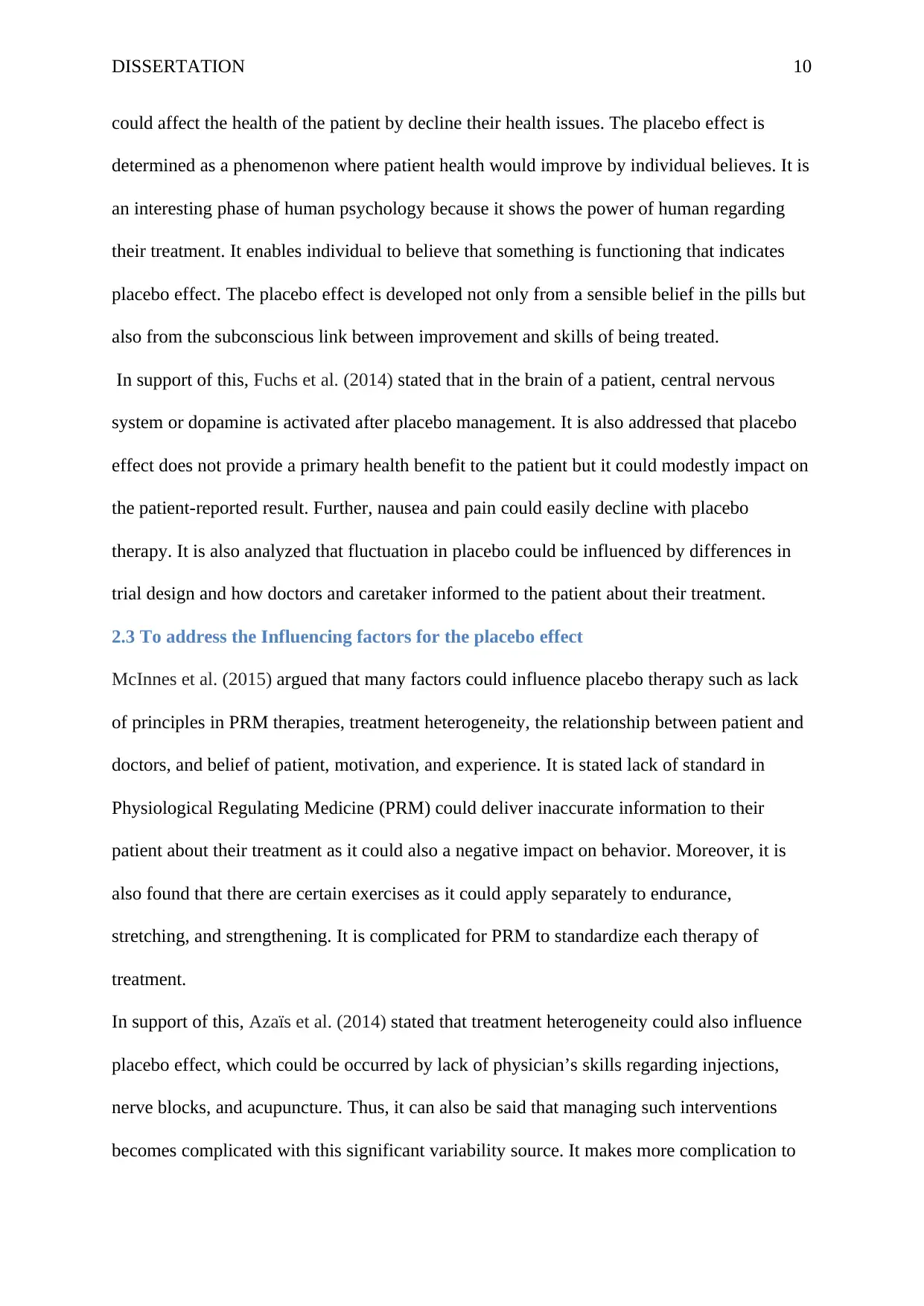
DISSERTATION 10
could affect the health of the patient by decline their health issues. The placebo effect is
determined as a phenomenon where patient health would improve by individual believes. It is
an interesting phase of human psychology because it shows the power of human regarding
their treatment. It enables individual to believe that something is functioning that indicates
placebo effect. The placebo effect is developed not only from a sensible belief in the pills but
also from the subconscious link between improvement and skills of being treated.
In support of this, Fuchs et al. (2014) stated that in the brain of a patient, central nervous
system or dopamine is activated after placebo management. It is also addressed that placebo
effect does not provide a primary health benefit to the patient but it could modestly impact on
the patient-reported result. Further, nausea and pain could easily decline with placebo
therapy. It is also analyzed that fluctuation in placebo could be influenced by differences in
trial design and how doctors and caretaker informed to the patient about their treatment.
2.3 To address the Influencing factors for the placebo effect
McInnes et al. (2015) argued that many factors could influence placebo therapy such as lack
of principles in PRM therapies, treatment heterogeneity, the relationship between patient and
doctors, and belief of patient, motivation, and experience. It is stated lack of standard in
Physiological Regulating Medicine (PRM) could deliver inaccurate information to their
patient about their treatment as it could also a negative impact on behavior. Moreover, it is
also found that there are certain exercises as it could apply separately to endurance,
stretching, and strengthening. It is complicated for PRM to standardize each therapy of
treatment.
In support of this, Azaïs et al. (2014) stated that treatment heterogeneity could also influence
placebo effect, which could be occurred by lack of physician’s skills regarding injections,
nerve blocks, and acupuncture. Thus, it can also be said that managing such interventions
becomes complicated with this significant variability source. It makes more complication to
could affect the health of the patient by decline their health issues. The placebo effect is
determined as a phenomenon where patient health would improve by individual believes. It is
an interesting phase of human psychology because it shows the power of human regarding
their treatment. It enables individual to believe that something is functioning that indicates
placebo effect. The placebo effect is developed not only from a sensible belief in the pills but
also from the subconscious link between improvement and skills of being treated.
In support of this, Fuchs et al. (2014) stated that in the brain of a patient, central nervous
system or dopamine is activated after placebo management. It is also addressed that placebo
effect does not provide a primary health benefit to the patient but it could modestly impact on
the patient-reported result. Further, nausea and pain could easily decline with placebo
therapy. It is also analyzed that fluctuation in placebo could be influenced by differences in
trial design and how doctors and caretaker informed to the patient about their treatment.
2.3 To address the Influencing factors for the placebo effect
McInnes et al. (2015) argued that many factors could influence placebo therapy such as lack
of principles in PRM therapies, treatment heterogeneity, the relationship between patient and
doctors, and belief of patient, motivation, and experience. It is stated lack of standard in
Physiological Regulating Medicine (PRM) could deliver inaccurate information to their
patient about their treatment as it could also a negative impact on behavior. Moreover, it is
also found that there are certain exercises as it could apply separately to endurance,
stretching, and strengthening. It is complicated for PRM to standardize each therapy of
treatment.
In support of this, Azaïs et al. (2014) stated that treatment heterogeneity could also influence
placebo effect, which could be occurred by lack of physician’s skills regarding injections,
nerve blocks, and acupuncture. Thus, it can also be said that managing such interventions
becomes complicated with this significant variability source. It makes more complication to
Paraphrase This Document
Need a fresh take? Get an instant paraphrase of this document with our AI Paraphraser
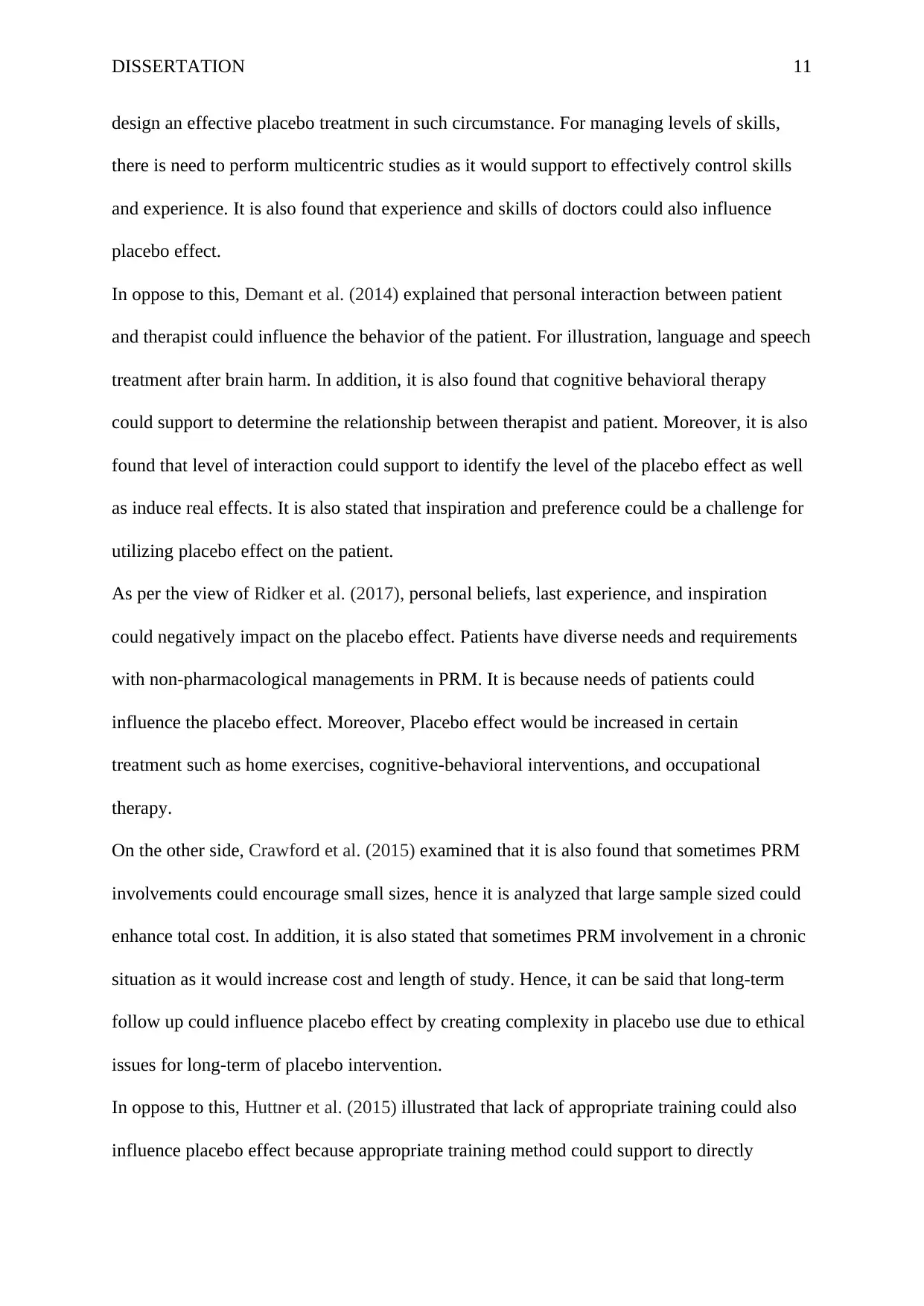
DISSERTATION 11
design an effective placebo treatment in such circumstance. For managing levels of skills,
there is need to perform multicentric studies as it would support to effectively control skills
and experience. It is also found that experience and skills of doctors could also influence
placebo effect.
In oppose to this, Demant et al. (2014) explained that personal interaction between patient
and therapist could influence the behavior of the patient. For illustration, language and speech
treatment after brain harm. In addition, it is also found that cognitive behavioral therapy
could support to determine the relationship between therapist and patient. Moreover, it is also
found that level of interaction could support to identify the level of the placebo effect as well
as induce real effects. It is also stated that inspiration and preference could be a challenge for
utilizing placebo effect on the patient.
As per the view of Ridker et al. (2017), personal beliefs, last experience, and inspiration
could negatively impact on the placebo effect. Patients have diverse needs and requirements
with non-pharmacological managements in PRM. It is because needs of patients could
influence the placebo effect. Moreover, Placebo effect would be increased in certain
treatment such as home exercises, cognitive-behavioral interventions, and occupational
therapy.
On the other side, Crawford et al. (2015) examined that it is also found that sometimes PRM
involvements could encourage small sizes, hence it is analyzed that large sample sized could
enhance total cost. In addition, it is also stated that sometimes PRM involvement in a chronic
situation as it would increase cost and length of study. Hence, it can be said that long-term
follow up could influence placebo effect by creating complexity in placebo use due to ethical
issues for long-term of placebo intervention.
In oppose to this, Huttner et al. (2015) illustrated that lack of appropriate training could also
influence placebo effect because appropriate training method could support to directly
design an effective placebo treatment in such circumstance. For managing levels of skills,
there is need to perform multicentric studies as it would support to effectively control skills
and experience. It is also found that experience and skills of doctors could also influence
placebo effect.
In oppose to this, Demant et al. (2014) explained that personal interaction between patient
and therapist could influence the behavior of the patient. For illustration, language and speech
treatment after brain harm. In addition, it is also found that cognitive behavioral therapy
could support to determine the relationship between therapist and patient. Moreover, it is also
found that level of interaction could support to identify the level of the placebo effect as well
as induce real effects. It is also stated that inspiration and preference could be a challenge for
utilizing placebo effect on the patient.
As per the view of Ridker et al. (2017), personal beliefs, last experience, and inspiration
could negatively impact on the placebo effect. Patients have diverse needs and requirements
with non-pharmacological managements in PRM. It is because needs of patients could
influence the placebo effect. Moreover, Placebo effect would be increased in certain
treatment such as home exercises, cognitive-behavioral interventions, and occupational
therapy.
On the other side, Crawford et al. (2015) examined that it is also found that sometimes PRM
involvements could encourage small sizes, hence it is analyzed that large sample sized could
enhance total cost. In addition, it is also stated that sometimes PRM involvement in a chronic
situation as it would increase cost and length of study. Hence, it can be said that long-term
follow up could influence placebo effect by creating complexity in placebo use due to ethical
issues for long-term of placebo intervention.
In oppose to this, Huttner et al. (2015) illustrated that lack of appropriate training could also
influence placebo effect because appropriate training method could support to directly
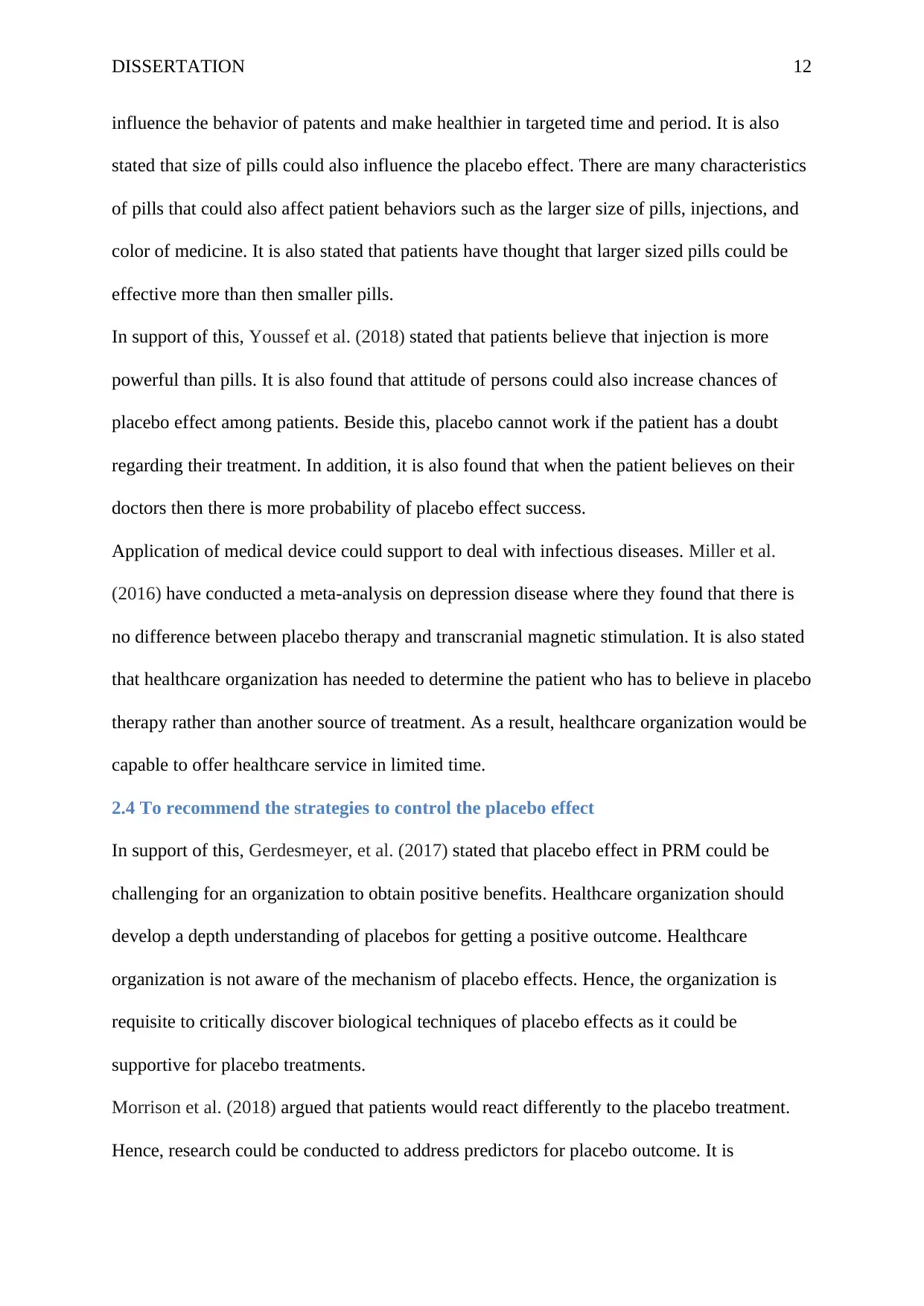
DISSERTATION 12
influence the behavior of patents and make healthier in targeted time and period. It is also
stated that size of pills could also influence the placebo effect. There are many characteristics
of pills that could also affect patient behaviors such as the larger size of pills, injections, and
color of medicine. It is also stated that patients have thought that larger sized pills could be
effective more than then smaller pills.
In support of this, Youssef et al. (2018) stated that patients believe that injection is more
powerful than pills. It is also found that attitude of persons could also increase chances of
placebo effect among patients. Beside this, placebo cannot work if the patient has a doubt
regarding their treatment. In addition, it is also found that when the patient believes on their
doctors then there is more probability of placebo effect success.
Application of medical device could support to deal with infectious diseases. Miller et al.
(2016) have conducted a meta-analysis on depression disease where they found that there is
no difference between placebo therapy and transcranial magnetic stimulation. It is also stated
that healthcare organization has needed to determine the patient who has to believe in placebo
therapy rather than another source of treatment. As a result, healthcare organization would be
capable to offer healthcare service in limited time.
2.4 To recommend the strategies to control the placebo effect
In support of this, Gerdesmeyer, et al. (2017) stated that placebo effect in PRM could be
challenging for an organization to obtain positive benefits. Healthcare organization should
develop a depth understanding of placebos for getting a positive outcome. Healthcare
organization is not aware of the mechanism of placebo effects. Hence, the organization is
requisite to critically discover biological techniques of placebo effects as it could be
supportive for placebo treatments.
Morrison et al. (2018) argued that patients would react differently to the placebo treatment.
Hence, research could be conducted to address predictors for placebo outcome. It is
influence the behavior of patents and make healthier in targeted time and period. It is also
stated that size of pills could also influence the placebo effect. There are many characteristics
of pills that could also affect patient behaviors such as the larger size of pills, injections, and
color of medicine. It is also stated that patients have thought that larger sized pills could be
effective more than then smaller pills.
In support of this, Youssef et al. (2018) stated that patients believe that injection is more
powerful than pills. It is also found that attitude of persons could also increase chances of
placebo effect among patients. Beside this, placebo cannot work if the patient has a doubt
regarding their treatment. In addition, it is also found that when the patient believes on their
doctors then there is more probability of placebo effect success.
Application of medical device could support to deal with infectious diseases. Miller et al.
(2016) have conducted a meta-analysis on depression disease where they found that there is
no difference between placebo therapy and transcranial magnetic stimulation. It is also stated
that healthcare organization has needed to determine the patient who has to believe in placebo
therapy rather than another source of treatment. As a result, healthcare organization would be
capable to offer healthcare service in limited time.
2.4 To recommend the strategies to control the placebo effect
In support of this, Gerdesmeyer, et al. (2017) stated that placebo effect in PRM could be
challenging for an organization to obtain positive benefits. Healthcare organization should
develop a depth understanding of placebos for getting a positive outcome. Healthcare
organization is not aware of the mechanism of placebo effects. Hence, the organization is
requisite to critically discover biological techniques of placebo effects as it could be
supportive for placebo treatments.
Morrison et al. (2018) argued that patients would react differently to the placebo treatment.
Hence, research could be conducted to address predictors for placebo outcome. It is
⊘ This is a preview!⊘
Do you want full access?
Subscribe today to unlock all pages.

Trusted by 1+ million students worldwide
1 out of 67
Related Documents
Your All-in-One AI-Powered Toolkit for Academic Success.
+13062052269
info@desklib.com
Available 24*7 on WhatsApp / Email
![[object Object]](/_next/static/media/star-bottom.7253800d.svg)
Unlock your academic potential
Copyright © 2020–2026 A2Z Services. All Rights Reserved. Developed and managed by ZUCOL.





